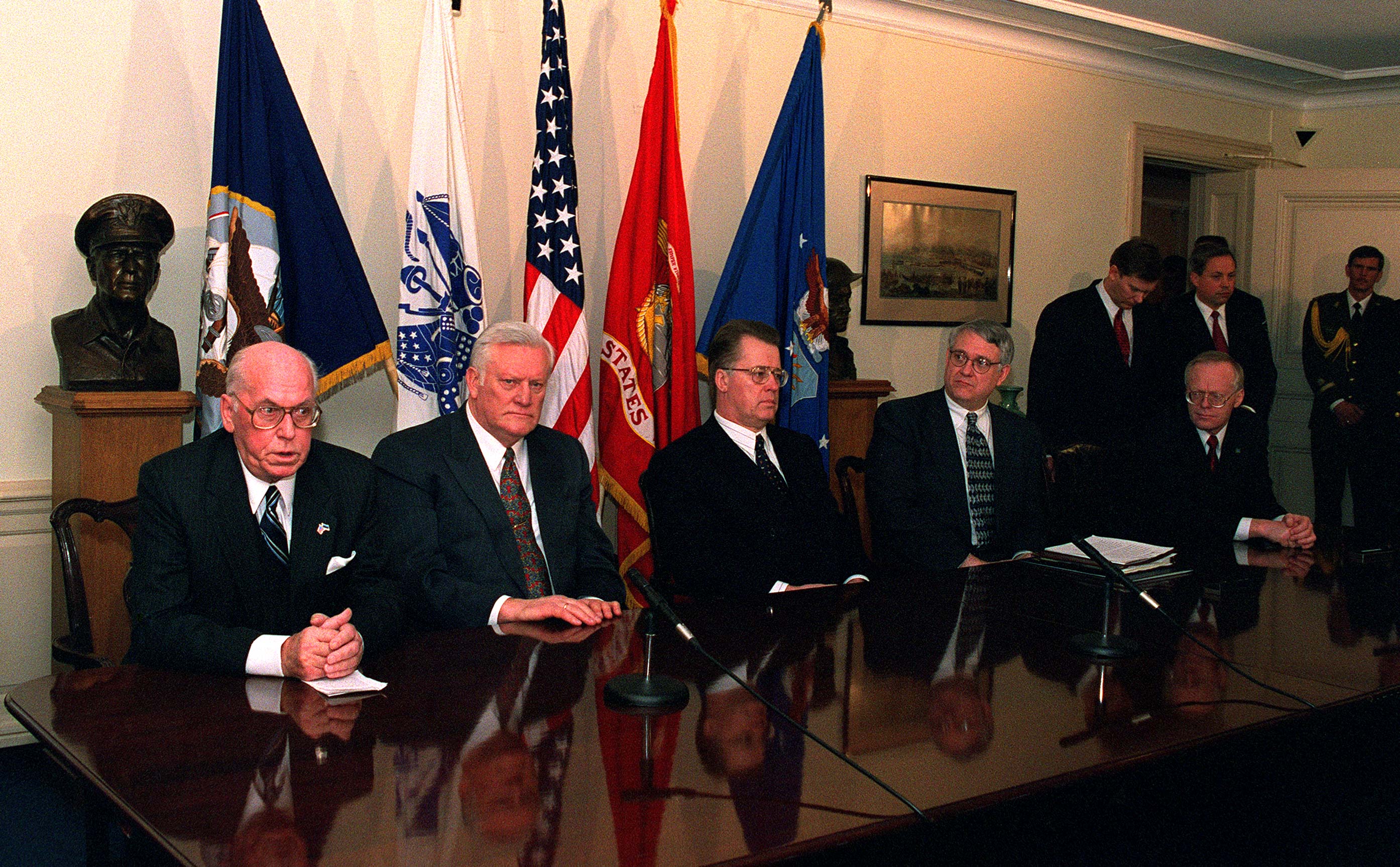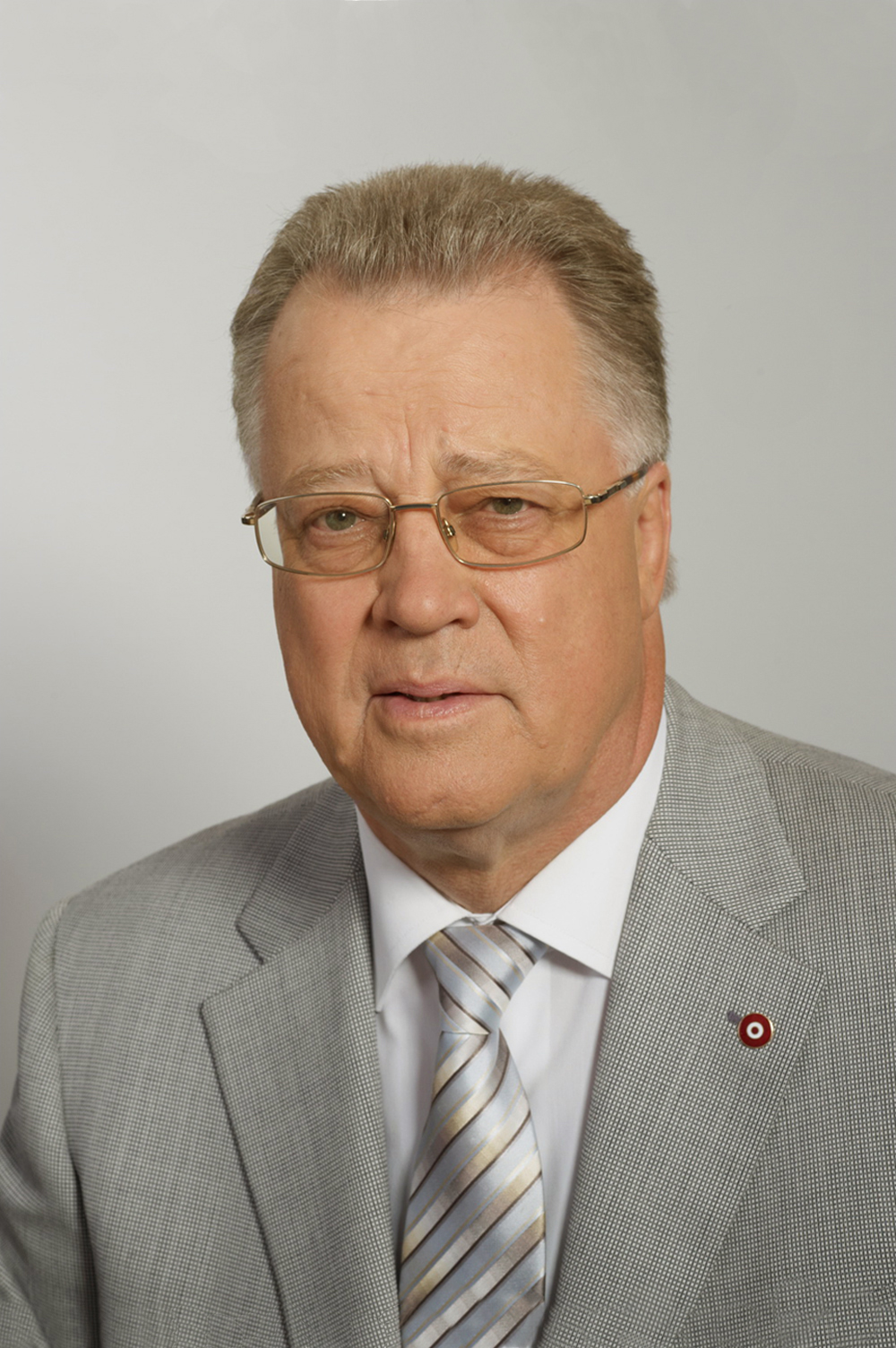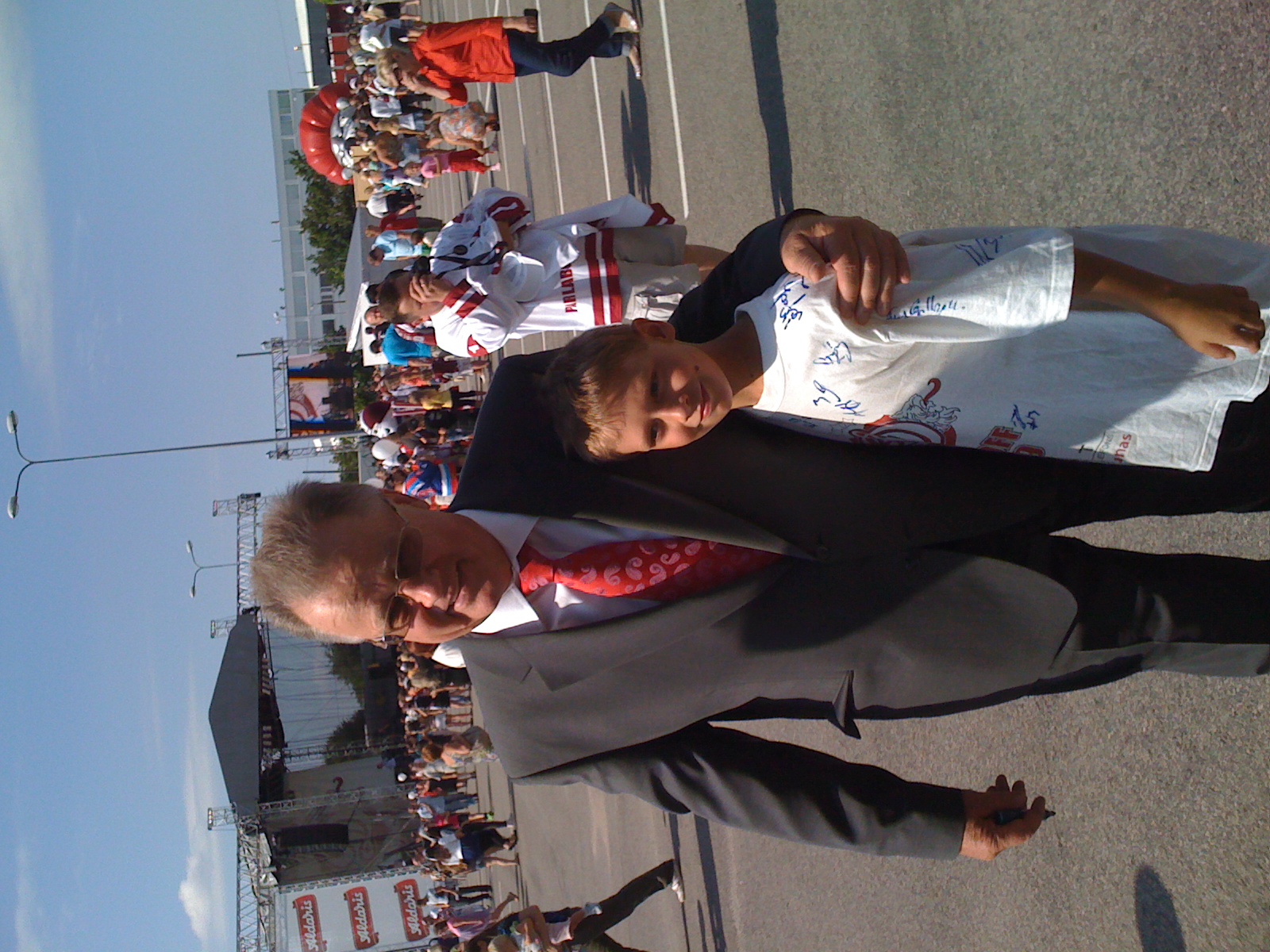1. Early Life and Background
Guntis Ulmanis's early life was profoundly shaped by the political turmoil of the 20th century in Latvia, particularly the impact of Soviet occupation and his family's historical ties to the country's pre-war independence movement.
1.1. Birth and Family
Guntis Ulmanis was born in Riga, Latvia, on 13 September 1939. His great-uncle, Kārlis Ulmanis, was a highly prominent Latvian politician during the interwar period who served as the last President of Latvia before the Soviet occupation. In 1941, when Guntis was just one year old, the Soviet occupation led to the forced deportation of his family, including his mother, Vera Ulmanis (née Goldmanis), to Krasnoyarsk Krai in Siberia, Russian SFSR. His father, Eduards Ulmanis (born 1912), who was the son of Kārlis Ulmanis's brother Jānis Ulmanis (born 1865), was accused of spying against the Soviet Union and sentenced to ten years in prison in 1941.
In 1946, the family was allowed to return to Latvia but was prohibited from settling in Riga due to their politically unfavorable background. They instead resided in Ēdole in the Kuldīga area of the Latvian SSR. In 1949, the remaining members of the Ulmanis family faced the threat of another deportation during the March deportation. To avoid this fate, Guntis Ulmanis's mother remarried, and his surname was temporarily changed to Rumpītis. However, upon receiving his first passport in 1955, Ulmanis chose to revert to his birth surname.
1.2. Education
After returning to Latvia in 1946, Guntis Ulmanis began his schooling in Ēdole. Following the relocation of his relatives in 1950, he moved with his mother to Jūrmala, where he continued his education at Pumpuri Secondary School. After graduating, he enrolled in the Latvian State University, where he studied at the Faculty of Economics, specializing in industrial planning economics, graduating in 1963.
2. Career Before Presidency
Before his election as president, Guntis Ulmanis navigated a career under Soviet rule, marked by both professional advancement and politically motivated setbacks, before actively entering politics during Latvia's reawakening.
2.1. Professional Life in the Soviet Era
Upon completing his university studies in 1963, Ulmanis was conscripted into the Soviet Army, serving for two years until 1965. In 1965, he joined the Communist Party of the Soviet Union, a strategic move often necessary for career progression during that era. He began his professional life as an economist at a construction site and later advanced to become an administrator for tram and trolleybus services in Riga.
His career continued to progress, leading to his appointment as deputy chairman of the planning committee of the Riga Executive Committee, which served as the city government. However, his familial ties to the former President Kārlis Ulmanis were eventually discovered, resulting in his dismissal from this position in 1971 due to political disfavor. Following this setback, he worked in various lower-level positions within the Riga municipal service system. During this period, he also taught construction economics at the Riga Polytechnical Institute and economic planning at the Latvian State University, sharing his expertise despite professional limitations.
2.2. Singing Revolution and Entry into Politics
The Singing Revolution of the late 1980s, a period of widespread non-violent protests that led to the restoration of independence in the Baltic States, marked a turning point in Guntis Ulmanis's life. In 1989, during this period of national awakening, he formally resigned from the Communist Party and publicly reverted to using his original surname, Ulmanis, symbolizing a reclaiming of his family's heritage and a rejection of Soviet influence.
Following Latvia's full restoration of independence in 1991, Ulmanis rapidly ascended in the newly established democratic structures. In 1992, he was appointed as a Council Member of the Bank of Latvia. That same year, he joined the Latvian Farmers' Union, the political party historically associated with his great-uncle, Kārlis Ulmanis, signaling his formal entry into the political arena. In 1993, following the first elections to the Saeima (Latvian Parliament) in 62 years, Ulmanis was elected as a deputy. Subsequently, the Saeima elected him as the fifth President of Latvia, and the first president since the full restoration of independence in 1991. In the initial round of this indirect election, he placed third, but ultimately won the runoff after one of his leading opponents, Gunārs Meierovics, withdrew from the race. Anatolijs Gorbunovs had served as acting president since Latvia's independence in 1990 until Ulmanis's election.
3. Presidency (1993-1999)
Guntis Ulmanis's tenure as President of Latvia was defined by a strong focus on re-establishing Latvia's sovereignty, promoting social cohesion, and integrating the nation into the European and transatlantic communities.

3.1. Election and Re-election
Guntis Ulmanis was elected as Latvia's first president after the full restoration of its independence on 7 July 1993 by the Saeima in the third round of voting. His election marked a symbolic return to the democratic traditions of pre-war Latvia, bridging the historical gap of Soviet occupation. On 18 June 1996, he was re-elected for a second term in the first round of elections, demonstrating public confidence in his leadership. His opponents in this election included Saeima speaker Ilga Kreituse, Imants Liepa, and former Latvian Communist Party chairman Alfrēds Rubiks, who was incarcerated at the time. He served until 7 July 1999, when he was succeeded by Vaira Vīķe-Freiberga.
3.2. Domestic Policies and Reforms
During his presidency, Ulmanis exhibited a strong commitment to democratic principles and social justice within Latvia. A significant human rights achievement was his declaration of a moratorium on the death penalty, bringing Latvia in line with the norms of the Council of Europe and advocating for the full abolition of capital punishment in Latvian law.
Ulmanis actively championed the creation of a unified society, particularly addressing the complex issues surrounding citizenship. In 1998, he actively supported amendments to the Citizenship Law that would grant citizenship to all individuals born in Latvia after 21 August 1991 (the date of Latvia's full re-independence) and eliminate the controversial "naturalization limits," which had previously restricted the number of non-citizens who could obtain citizenship annually. Although a petition by 36 nationalist deputies forced the proposed law to a national referendum, Ulmanis actively and successfully campaigned for the adoption of these amendments by the population, emphasizing their importance for social inclusion and democratic development.
Ulmanis also showed a deep interest in the study and explanation of Latvian history. In 1999, he established the Latvian History Commission, in cooperation with the Prime Minister, to thoroughly research totalitarian regimes and their consequences in Latvia. He consistently called upon the international community to condemn the totalitarian regimes of the former Soviet Union.
3.3. Foreign Policy and International Relations
A cornerstone of Guntis Ulmanis's presidency was his focus on foreign policy, aimed at strengthening Latvia's international standing and integrating it into the global community. A major diplomatic achievement during his term was the conclusion of the Latvian-Russian treaty concerning the withdrawal of Russian Armed Forces from Latvian territory, a crucial step in asserting Latvia's full sovereignty and ending the legacy of Soviet military presence.
Under his leadership, Latvia successfully joined the Council of Europe, signifying its adherence to European democratic standards. Ulmanis also oversaw Latvia's formal applications for membership in both the European Union and NATO, initiatives that laid the groundwork for the country's future integration into major Western political and security alliances. He dedicated significant effort to building and strengthening cooperative relationships with other European nations and international and regional organizations, enhancing Latvia's visibility and influence on the world stage.
4. Post-Presidency Activities
After stepping down from the presidency, Guntis Ulmanis remained engaged in public life through various social and civic initiatives, eventually returning to politics before his second retirement from parliamentary duties.

4.1. Social Activities and Retirement
Upon the conclusion of his presidential term in 1999, Guntis Ulmanis initially retired from active politics to focus on social and public activities. On 17 March 2000, he established the Guntis Ulmanis Fund, an organization dedicated to various social initiatives. He played a significant role in organizing the 2006 IIHF World Championship held in Riga, demonstrating his commitment to national events. Additionally, he chaired the Riga Castle Reconstruction Council, overseeing the restoration of the historic Riga Castle, the official residence of the President of Latvia.
4.2. Return to Politics and Second Retirement
In 2010, Guntis Ulmanis made a return to active politics, accepting the chairmanship of the newly formed political alliance 'For a Good Latvia' (Par Labu Latviju!Latvian). This alliance comprised the People's Party and Latvia's First Party/Latvian Way. The alliance participated in the October 2010 parliamentary election, winning eight seats in the 10th Saeima. As a result, Ulmanis was elected as a Saeima deputy. However, in 2011, he announced his decision not to seek re-election in the 2011 Latvian parliamentary election. Consequently, he ceased to be a deputy in November 2011, following the inauguration of the 11th Saeima, and also stepped down from his role as chairman of the 'For a Good Latvia' alliance.
4.3. Other External Activities
Beyond his political and direct social engagements, Guntis Ulmanis has participated in various other external activities. He serves as a member of the international advisory council for the Victims of Communism Memorial Foundation, an organization dedicated to educating the public about the history of communism. On 21 September 2015, Ulmanis assumed the position of Chief Executive Officer of the ice hockey club Dinamo Riga, succeeding Aigars Kalvītis, who had stepped down to take on a CEO role at the company Latvijas Gāze.
5. Personal Life and Works
Guntis Ulmanis's personal life reflects his commitment to family and a range of intellectual and recreational pursuits.

He has been married to Aina Ulmane (née Štelce) since 1962. Together, they have two children: a daughter, Guntra (born 1963), and a son, Alvils (born 1966). They also have three grandchildren: Paula (born 1994), Rūdolfs (born 2000), and Matīss (born 2006). In his leisure time, Ulmanis enjoys reading history books and memoirs. He is also an active sportsman, known for playing tennis, basketball, and volleyball. He frequently spends his summers at his home in Smārde Parish.
Guntis Ulmanis has authored two autobiographical works, providing insights into his experiences and reflections on his life and presidency. These include No tevis jau neprasa daudz (Not much is required from you yet), published in 1995, and Mans prezidenta laiks (My time as President), released in 1999.

6. Honours
Guntis Ulmanis has received numerous national and international honours in recognition of his service and contributions.
6.1. National Honours
- Latvia: Commander Grand Cross with Chain of the Order of the Three Stars
6.2. Foreign Honours
- Denmark: Knight of the Order of the Elephant (18 March 1997)
- Estonia: Collar of the Order of the Cross of Terra Mariana (23 October 1996)
- Germany: Grand Cross Special Class of the Order of Merit of the Federal Republic of Germany
- Iceland: Knight Grand Cross of the Order of the Falcon (8 June 1998)
- Norway: Knight Grand Cross of the Order of St. Olav
- Poland: Order of the White Eagle